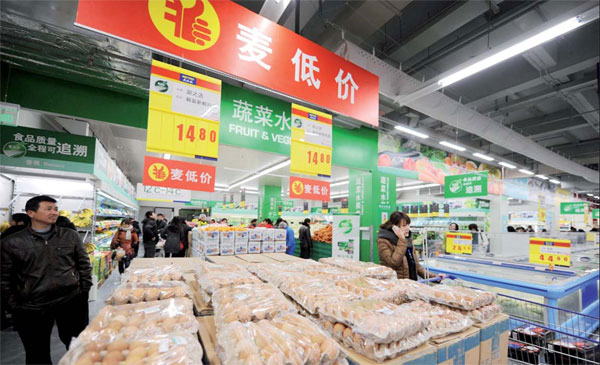The more the merrier for Metro
Updated: 2013-05-03 07:41
By Tang Zhihao (China Daily)
|
||||||||
|
German wholesale retailer Metro Cash & Carry plans to open 12 outlets in China this year. Provided to China Daily |
German retailer plans 12 new store openings in China this year, to focus on more growth sectors
Unlike most of its US and European peers, German self-service wholesale retailer Metro Cash & Carry believes that there is enough room for expansion in China and that the recent slowdown is just a blip on the growth radar.
Metro, the world's third biggest retailer by sales behind France's Carrefour and the US-based Wal-Mart Stores Inc, is planning to open 12 outlets in China this year, following an equally fast expansion last year.
As with last year, the focus for Metro will be to reach more destinations in China. It has already made a beginning by setting up its 64th store in China in Yancheng, Jiangsu province last month.
Last year, the German retailer embarked on a broad-based expansion plan, in which it spread its wings in big cities like Shanghai and entering newer destinations like Zhenjiang in Jiangsu province and Zhongshan in Guangdong province.
"The rapid expansion plan for 2013 shows Metro's long-term commitment to China," says Uwe Hoelzer, president of Metro China.
Hoelzer says the 23 percent growth in revenue, to 1.89 billion euros, recorded by Metro China last year is testimony to China's growth credentials. Metro Group's global sales during the same period grew just 1.7 percent to 32 billion euros.
Unlike Metro, most of the other major retailers have shelved or scaled down expansion plans in China because of flagging growth. The China Chain Store & Franchise Association says China's top 100 chain store operators grew 10.8 percent last year, compared with 20 percent in 2011 and 21.1 percent in 2010.
"We are still talking about GDP growth of 7 percent, and expectations are that full-year growth may average about 8 percent. So there is still enough room for us to go ahead with out expansion plan," Hoelzer says.
Rising food safety concerns in China is good news for quality-conscious international retailers like Metro, Hoelzer says. "People are paying more attention to food quality, and this allows us to grab market share from wet and street markets and also from other international players. Metro China has established a food tracing system that allows companies and consumers to monitor each and every step of the supply chain," he says.
To further support its retail business in China, Metro is now embarking on a strategy to bring more consumers like corporate clients and caterers under its fold.
"Based on our understanding of the Chinese market, we have identified four strategic priorities, including large companies and offices, welfare goods, canteens and restaurants, and catering to the private needs of quality-conscious customers as our growth areas," Hoelzer says.
Though Metro has been in China for more than 16 years, it has never targeted business operators like hotels or restaurants. Instead, most of its activities have been targeted at growing its membership card business by concentrating on individual business owners. Though such a focus did help initially, it had its share of problems, as many Chinese consumers started confusing Metro with other global retailers like RT-Mart or Auchan.
In an interview last year, Hoelzer said, "Metro China's focus was on targeting customers who have a business of their own. This is our business. When you see our stores, then you know that this is the place where our business customers do their work. Our stores are not exactly the right places for people to go shopping."
Though Metro Cash & Carry was largely known as a wholesaler in the overseas markets, the company realized that it stood to gain if it focused more on individual consumers in China. With this in mind the company started to issue private membership cards to individual customers, Hoelzer says, adding that private customers account for more than half of Metro's sales in China.
"Both (B2B and B2C) businesses bring us a lot of synergies. We are dependent on both," he says.
"The revenues generated from the retailing business is the main driver for Metro's rapid expansion in China," says Peng Jianzhen, deputy secretary-general of the China Chain Store & Franchise Association.
Unlike other global chain store operators such as Carrefour and Walmart, Metro still has a relatively weak presence in the Chinese retail market. By the end of last year, Carrefour had nearly 219 stores and Walmart some 295 stores in China, according to www.linkshop.com, a retailing industry information provider in China.
"Metro China's expansion is still not that fast enough when compared with the retail moves of other companies in China during the last few years. I would say that 12 stores is normal speed," Peng says.
In 2012, Walmart opened 30 new stores, while Carrefour opened 18 new stores, linkshop says.
tangzhihao@chinadaily.com.cn
(China Daily 05/03/2013 page17)

 Michelle lays roses at site along Berlin Wall
Michelle lays roses at site along Berlin Wall
 Historic space lecture in Tiangong-1 commences
Historic space lecture in Tiangong-1 commences
 'Sopranos' Star James Gandolfini dead at 51
'Sopranos' Star James Gandolfini dead at 51
 UN: Number of refugees hits 18-year high
UN: Number of refugees hits 18-year high
 Slide: Jet exercises from aircraft carrier
Slide: Jet exercises from aircraft carrier
 Talks establish fishery hotline
Talks establish fishery hotline
 Foreign buyers eye Chinese drones
Foreign buyers eye Chinese drones
 UN chief hails China's peacekeepers
UN chief hails China's peacekeepers
Most Viewed
Editor's Picks

|

|

|

|

|

|
Today's Top News
Shenzhou X astronaut gives lecture today
US told to reassess duties on Chinese paper
Chinese seek greater share of satellite market
Russia rejects Obama's nuke cut proposal
US immigration bill sees Senate breakthrough
Brazilian cities revoke fare hikes
Moody's warns on China's local govt debt
Air quality in major cities drops in May
US Weekly

|

|








